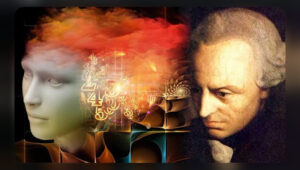INTRODUCTION:
In the study of knowledge-percepts, we may come across speculative arguments and theoretical propositions which are based on an outlook that quintessentially stems from the fundamental thought of something produced and/or originated from outside of this universe- the physical excavations fail to elucidate the significant basis of the occurrence of such events. They are primarily in the form of a realm where the human beings cannot reach, which are the things in their real form for Plato, noumena for Immanuel Kant and in general we call this to be rooted in the metaphysical section of the philosophy. A section which mainly deals with the notions such as supreme god-head, truth of the different heavens so on and so forth. Such metaphysical claims seem to hold very little water for us to believe, the idea of “Evidentialism” of Hume, Clifford and Feldman somewhat cannot be applied to various aspects of metaphysics. Are these troublesome ideas really valuable or a figment of imagination constructed by the individual for “Justifying the unjustifiable” as asserted by Salman Khurseed. We discuss the myth of metaphysical propositions and how they can affect the lives of people in a preposterous manner.
CONCEPTUAL ANALYSIS:
The general hypothesis for this article is that the properties, characteristics and manifestations surrounding metaphysics and stemming from it must be abnegated, rejected and outlawed- to support this claim, we will look at what Prof. A.J Ayer (British philosopher) has to say, he contends: “a sentence had literal meaning, if and only if the proposition it expressed was either analytically or empirically verifiable”- this has to be done in an inquisitive manner, we must (1) ask questions and for this, “we enquire in every case, what observation would it lead us to answer the question and, if none can be observed, we must conclude that sentence under consideration does not express a genuine question, no matter however strongly its grammatical appearance may suggest us otherwise” words like omnipresent, omnipotent, things-in-themselves cannot be alluded logically, they may sound structurally pleasing and metaphorically realistic but the theists cannot prove the relevant truth-value of these claims with certainty.
There are situations when we may not be able to defend the claims made on sound reason, simply because we cannot demonstrate them practically- but there lies a major position which needs to be unearthed here, for example, says Ayer, “suppose we say that we have mountains on the farther side of the moon” well, this is a claim we cannot prove to be true simply because we cannot tell with any exactness anything about the existence of the mountains, proof to be more precise. 
Philosopher puts forward a perfect example to explicate this claim “god exists” or “god is all-powerful” for statements which we cannot count on our experiences, our sense datum to verify, then, those lines are rendered no meaning, devoid of valuable thought and is downright parables of delusion, deception and illusion at best. Therefore, Ayer emphatically reiterates that “metaphysical statements are pseudo statements and, at best, emotive appeals” which is without any knowledge-claims or based on reasoned arguments.
CONCLUSION:
“It remains a scandal to philosophy, and to human reason in general, that it is necessary to take the existence of things outside us…merely on faith, and, if anyone should happen to doubt it, no adequate proof can be produced to oppose him.” says Kant. It can be understood from a precursory glance into the initial pages that contains the philosophy of Prof. Ayer is that metaphysicians are deceived by grammar, regrettably posing as philosophers but they are perpetrating erroneous reasoning such, which is visibly seen in the claim that “material world is unreal” Jagat-Mithyā as we colloquially say. He encourages philosophers to find truth about reality, about knowledge and how the universe functions, not about the ten-headed man or afterlife.
The metaphysical postulations are nothing but sham orchestrated by the “self deluders” as said by Nietzsche for philosophers who are oscillating between their will to truth and castrations made by hallucinations in their minds because for Ayer, any knowledge-aspect transcending the boundary of logic, reasoning and critical evaluation on the ground of experience is not knowledge- it must be eliminated, more precisely, metaphysics should be eliminated. Thus, this makes the case for his magnum opus “Elimination of Metaphysics”.




















